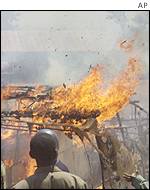The Issue of which party or candidate to vote for is no longer a big problem to some. But some questions remain unanswered: Have they (politicians) educated the public to love one another and reach a consensus amicably incase of a sticky situation? Is the government living to its constitutional mandate to protect its citizens and provide security?
 From April- October 2006, many people lost their lives, got injured, lost properties or got displaced. The causes pointed out include colonial land reforms that dismantled pastoralism badly, water, ethnic hostilities, bandit attacks or foreign-rebel attacks. Names of places like Moyale, Marsabit, Laikipia, Pokot, Turkana, Trans Nzoia, Baringo, Samburu and Molo continue to fill the press.
From April- October 2006, many people lost their lives, got injured, lost properties or got displaced. The causes pointed out include colonial land reforms that dismantled pastoralism badly, water, ethnic hostilities, bandit attacks or foreign-rebel attacks. Names of places like Moyale, Marsabit, Laikipia, Pokot, Turkana, Trans Nzoia, Baringo, Samburu and Molo continue to fill the press.Looking back at 1992 and 1997, the clashes that sprang in most parts on the country were politically instigated compared to the 2006 clashes. Communities in the government then were against communities that were out of government. A vivid example is the Molo clashes that affected the Kalenjin and Gikuyu communities deeply.
“In October 1991, a gang of youths — said to be from the Kalenjin ethnic group, armed with spears and machetes — attacked members of the Luo ethnic group living at Meiteitei farm in the south Nandi district of the Rift Valley Province.2 In these attacks, thirty houses were burnt and some 4 000 people were left homeless.3 In November and December, fighting between the Luo and Kalenjin extended to Western and Nyanza Provinces, and in the process drew in members of the Luhyia and Kikuyu ethnic groups.” observes Lucy Mulli of Africa Watch, Institute for Security Studies in her article Understanding election clashes in Kenya, 1992 and 1997.
BBC states that approximately 2000 people died in the westerrn part of the country out of the tribal clashes.
The above explanation affirms that the role of politics in Kenya’s clashes is negative. Today, issues concerning security have been politicized thus slowing down the government machinery to deal with any security matter.
 As Oscar Obonyo of Daily Nation Newspaper puts it, “current clashes in Laikipia District have been deliberately induced by the State for political reasons, the Narok North MP claims that it is a ploy to gain advantage ahead of 2007 elections.” [Daily Nation 10/8/2006]
As Oscar Obonyo of Daily Nation Newspaper puts it, “current clashes in Laikipia District have been deliberately induced by the State for political reasons, the Narok North MP claims that it is a ploy to gain advantage ahead of 2007 elections.” [Daily Nation 10/8/2006]If Kenya is to have peace, the problems of the past have to be dealt with first as it moves forward. The perpetrators have to be brought to book as an example to anyone who instigates the public. The Likoni clashes in 1997 massacre case in point resulted to more than 40 people dead, more than 120,000 people displaced and its social credence as so fresh.
It will take resettling victims of clashes and psychological services too, for them to go back to normal life.
Education as key to societal advancement should be provided to the pastoralists on the number of the animals they keep and where to graze while the government engages itself in land zoning for grazing (substantive measures on land reforms). This will lessen land disagreement related to grazing lands as exemplified by the Laikipia incident.
The government should be proactive all the time to avoid the conflicts and set up transitional mechanism to deal with the past abuses like the Waggala Massacre, Molo clashes and many others.
As Korir Singoei, the Executive Director of the Centre for Minority Rights puts it, the incompetence of the police has resulted to segregation and impartiality at all levels. The police have to be reminded of the professional ethics and be re-armed to avoid being over powered by bandits and thugs.
The Kenyan citizens also have a big role to play in the issues of security and that is to avoid instance that might flare up conflicts. Information relay to the relevant government structures will be your duty as a citizen.
For the foreign instigated clashes like the Mandera case in 2004 where by Garres were backed by Ethiopian militiamen while the Murule were helped by the Marehan clan militiamen from Southern Somalia. Diplomacy should be applied very fast to less tension amongst fellow countrymen.
In conclusion, with issues of peace, all are important to contribute positively, be it politicians or citizens or government. Don’t you think you matter?
*The photos have been got from AP and BBC




Very well written I must say and you have raised lots of relevant points. Too many middle class nairobians are ignoring the seeds of chaos in our midst!